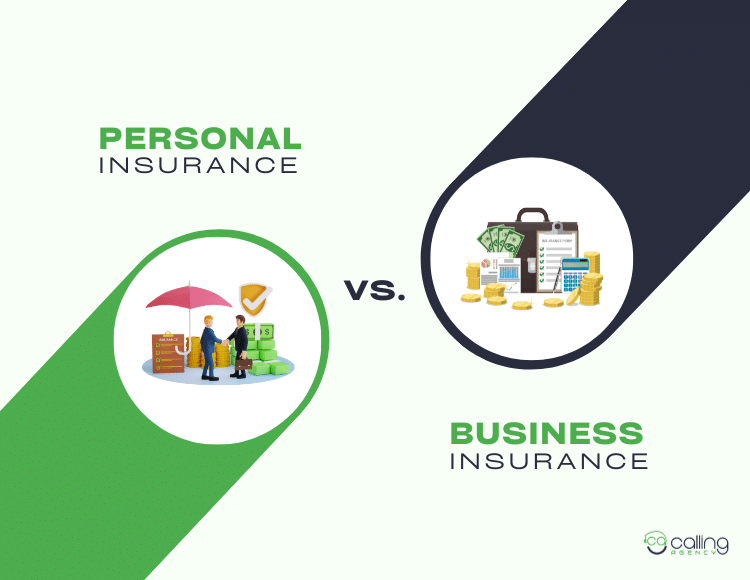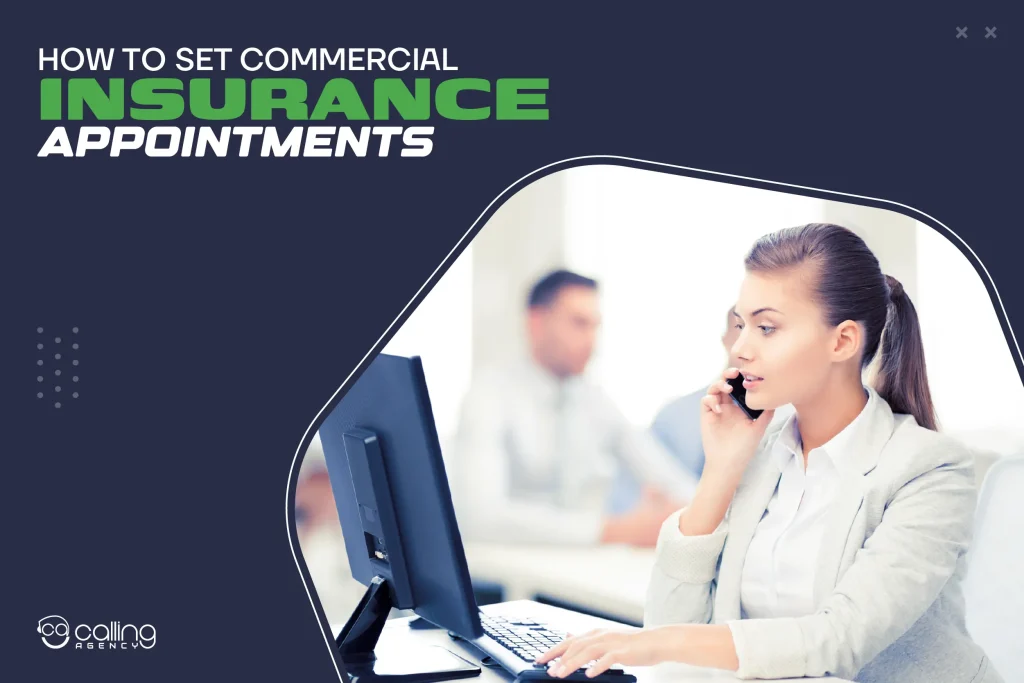Commercial insurance appointment setting is setting appointments to cover insurance for businesses instead of individuals. Remote appointment setters can start to set commercial insurance by researching prospects and business insurance policies.
Appointment setting is a sales and marketing process by which a sales representative gets in touch with pre-qualified leads and sets up appointments. Appointment setting in the insurance sector helps to reach and convince potential customers why they need insurance and set an appointment.
Commercial insurance focuses on protecting businesses from various risks. It is essential for any business owner who wants to safeguard their assets and operations. But you must follow some strategies to make your commercial insurance appointment-setting approach effective.
This blog will teach you the strategies on how to set commercial insurance appointments remotely and the differences between commercial and individual insurance appointment settings.
Differences Between Commercial and Individual Insurance Appointment Setting

An insurance appointment setter contacts potential leads on behalf of an insurance company and sets appointments by discussing their insurance needs.
There are two types of insurance appointment settings: commercial or business insurance and individual or personal insurance. Business insurance is for business clients, and personal insurance is for individual clients.
A remote appointment setter can do both insurance appointment settings through phone calls, emails, social media, referrals, etc. However, phone calls are still the most effective and preferred method of communication for most clients. Phone calls allow you to build trust, convey your value proposition, and overcome objections in real-time.
Although their approach is quite similar, some key differences exist between commercial and individual insurance appointment settings.
You must know properly about these two types of insurance before setting appointments. Let’s first understand what differentiates commercial insurance appointment setting from individual insurance appointment setting.
Commercial Insurance Appointment Setting
Commercial insurance appointment setting is scheduling a meeting with a potential business client to discuss their insurance needs and offer them a suitable policy.
Commercial insurance deals are usually larger and more complex. They involve multiple decision-makers, different types of coverage, and longer sales cycles. Therefore, commercial insurance appointment setters must be more prepared, professional, and persistent.
Further, commercial insurance is a highly competitive market, with many agents and brokers vying for the same prospects. So, commercial insurance appointment setters must differentiate themselves from the crowd by offering value, expertise, and trust.
Moreover, commercial insurance appointment setting requires formal and structured communication. Commercial insurance appointment setters must use business language, follow-up protocols, and presentation skills.
Individual Insurance Appointment Setting
Individual insurance appointment setting is the process of scheduling a meeting with a potential individual client to discuss their personal insurance needs and offer them a suitable policy.
The individual insurance deals are simple as they involve only the individual client. So, individual insurance appointment setters must be friendly and casual rather than highly professional.
Additionally, setting insurance appointments for individual clients is less competitive than setting commercial insurance appointments. Most potential individual clients buy insurance from referrals, online platforms, or direct carriers.
Individual insurance appointment settings don’t require formal and structured communication like commercial ones. Individual insurance appointment setters can use more casual and personal communication, such as texting, chatting, and storytelling.
How To Set Commercial Insurance Appointments (For Remote Appointment Setters)
Now that we know the differences between commercial and individual insurance appointment settings, let’s see how to set commercial insurance appointments for remote appointment setters. Here are some steps to follow:
1. Do In-Depth Research About Your Prospect
The first step to setting a commercial insurance appointment is to do in-depth research about your prospect. You need to know as much as possible about their industry, size, location, and history. Use their website, social media, and online reviews to gather information on their products, services, customers, and competitors.
Look into their industry publications, reports, and news to understand their goals, challenges, and pain points. Also, your network, such as referrals, partners, and clients, can provide you with information about potential business clients.
The more you know about your prospect, the better you can tailor your pitch, address their concerns, and show your value.
2. Know About Your Business Client’s Insurance Policy
After researching your potential business client, you must know about their business insurance policy. You can learn it by studying their public records, such as licenses, permits, and lawsuits. It will give you insight into the current insurance situation, such as coverages, costs, and claims.
Knowing about your client’s business insurance policy, you can better explain the benefits, features, and options to your prospect.
3. Learn Types of Commercial Insurance Policies
You can match the right policy to your prospect’s needs and preferences by knowing the different types of commercial insurance policies. Let’s look at some common commercial insurance policies that are advisable for businesses to protect themselves.
- Commercial General Liability Insurance: It is a type of policy created for all businesses. But it doesn’t protect against all risks. General liability insurance covers medical expenses, property damage, injury, settlement bonds, and defending lawsuits.
- Professional Liability Insurance: This policy is for businesses that provide services. It covers the loss caused by the service provided and protects against expenses due to errors or malpractice.
- Product Liability Insurance: This insurance policy is for manufacturers, wholesale distributors, and retailers. It protects businesses from costs connected to damages caused by products.
- Cyber Liability Insurance: It covers the financial losses and legal costs if your business suffers a cyberattack or data breach that compromises your data, systems, or reputation.
- Commercial Property Insurance: It is for businesses having significant physical property. This policy protects from losses in fire, storm, or theft events and covers damage to properties, like equipment, inventory, or furniture.
- Home-Based Businesses: This insurance policy provides additional coverage for equipment and inventory if you own a home-based business.
- Vehicle Insurance: It provides insurance to any vehicle used for a business. It covers the damage to the vehicles or injuries to others. The driver’s driving record and vehicle condition affect the price of vehicle insurance.
- Business Interruption Insurance: This commercial insurance policy is for businesses with physical locations. It covers the loss of income and extra expenses if your business is temporarily unable to operate due to a covered risk.
4. Commercial Insurance Coverages and Cost
On average, small business insurance costs about $14 to $124 a month. The cost of a commercial insurance policy depends on several factors about the business and the insurance coverage.
Different types of commercial insurance policies have different costs. If you know what commercial insurance coverage a business needs, you can demonstrate the value and affordability of your offer.
5. Pitch at the Correct Time
The correct time to pitch depends on your goal and the prospecting business you are pitching to. Knowing when to pitch is vital for a successful commercial insurance appointment setting.
Research the time zone differences and local preferences to determine the correct times to pitch. Pitching at these times increases the chances of setting an appointment.
The best time of day to cold call is before the end of the work day. Businesses usually finish all their tasks by then and are more prepared to listen to your pitch. So you will get more time to communicate with them without distractions.
Avoid calling prospects at unusual times, like at midnight. They will feel annoyed by your call, creating a negative impression. Also, don’t contact prospects on holidays or local events as they might not be available.
6. Build Your Prospects Trust in the First Few Seconds
Taking insurance policies for a business is crucial for owners. They often won’t be ready to buy insurance or interested in listening to your offerings. Capturing attention within the first few seconds is vital to turning leads into appointments.
Start your conversation with a bold statement, statistics, or a shocking fact to grab prospect’s curiosity and make them want to listen. Highlight the gap between their current situation and the desired outcome after getting insurance coverage.
Additionally, mention your customer reviews, testimonials, or ratings as social proof. Using numbers or data, display your impact on businesses after taking your insurance services. It will help you to build trust with your prospects.
Also, longer wait times will frustrate customers, and you will eventually lose sales. The average wait time is 1 minute and 30 seconds. After this time, callers will most probably hang up. So, ensure you don’t make your prospects wait.
7. Find a Suitable Call Schedule Draft
Creating an effective call schedule can be time-intensive, but it is essential for maintaining productivity.
When you can’t connect with a prospect by phone or if a prospect is not currently interested in purchasing commercial insurance, it is advisable to schedule a call draft for a later date. Collect the contact information of these prospects and develop a preliminary call schedule. It will ensure you are not missing out or overlooking any potential leads.
The perspectives of people can change over time. So, scheduling a follow-up call is crucial, especially when a lead initially shows no interest in insurance. Dedicate specific time slots for follow-up calls, carefully balancing the daily volume of calls.
8. Record The Conversation & Improve Your Skill
Improve your appointment-setting skills by recording and listening to past conversations. By carefully examining these interactions, you will gain deeper insights into prospects’ pain points, goals, and objections. This process will improve your ability to respond, ask relevant questions, and effectively guide conversations.
Analyzing your recorded calls lets you pinpoint previous errors or areas where your pitch may have lacked impact and identify improvement areas. It allows you to find cold calling motivation after rejection and sharpens your concentration during prospect engagements.
Pay particular attention to tone of voice, objection handling, and the overall effectiveness of your pitches. Moreover, look for cues and clues provided by prospects. It reveals crucial information about their level of interest, engagement, and readiness to make a purchase.
Consistent self-assessment and refinement will improve your appointment-setting skills. It will allow you to secure commercial insurance appointments with greater effectiveness.
Final Thoughts
Setting commercial insurance appointments for remote setters is challenging but rewarding. It can help you grow an insurance business and your career. Following the steps to set commercial insurance appointments can increase your chances of getting more prospects, clients, and referrals.
Setting commercial insurance appointments is a process that takes time and effort. You must keep learning, improving, and adapting to your prospects and the market’s changing needs and expectations.





